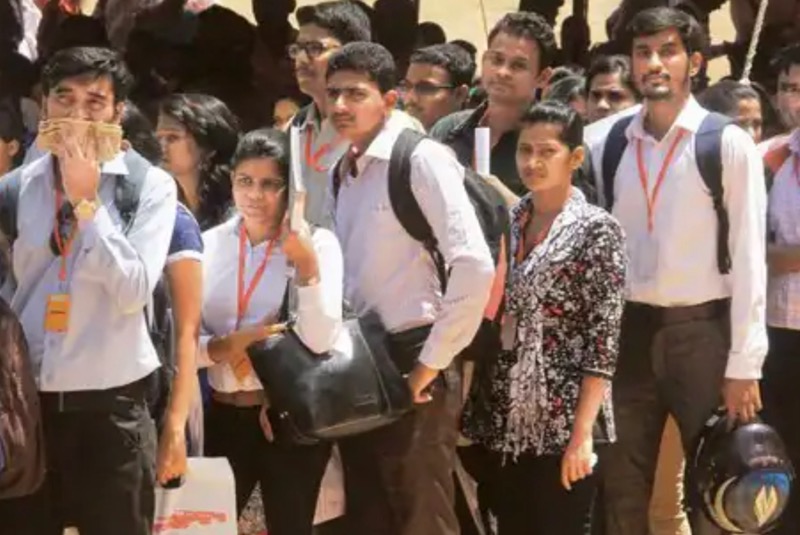‘I work as a taxi driver from midnight till 9 AM. Once I finish, I have a quick breakfast at the roadside stall and start work as a delivery boy until 5 PM. I go to my room, which I share with seven other people, and sleep for a few hours. Then, I wake up and go for the driving shift. I skip dinner every other day so that I get to save money to send home. While waiting for my customers, I look for jobs online. But there are no jobs.’
Sreenivas is a twenty-four-year-old man with a degree in computer engineering. He has also learnt coding. But he has been struggling to find a job for the past two years. His tanned face, with dark circles under his eyes from lack of sleep, shows exhaustion. His skeletal body looks emaciated.
‘I don’t know what to do,’ he says, with a choked voice, in a desperate attempt to hide his tears from a total stranger. ‘Sometimes, I wonder why I spent all those years studying for an engineering degree, why my parents took a loan to send me to engineering college if all I had to do was drive a taxi and work as a delivery boy. My parents proudly tell their friends and all our relatives that their son, an engineer, works in Bangalore. But they don’t know that I drive a taxi. What do I tell them? Should I tell them that after getting a degree in computer sciences, being a coder, I drive a taxi and work as a delivery boy at the age of twenty-four?’
Sreenivas is among the millions of educated young people in India who find it difficult to get a job. We spoke to several young people from different states – with degrees in engineering, law, medicine, biochemistry and genetics (two from the coveted IIT)– who have been struggling to find a job for the past two years.
Aditya*, a young man from one of the Indian Institutes of Technology who wanted to remain anonymous, said he has applied for many jobs but is struggling to find one. ‘I think preparing for IIT is easier than finding a job. Many of those IIT myths have now been shattered. When I was preparing for IIT, I thought that if I got into IIT, my life would be set. I thought I would have an insurance for life. I thought I would be able to get a job easily. But I have been struggling to find a job. This is like a shock to my system.’
Unemployment is a big issue in India. According to a recent poll by Reuters economists, India, the world’s fastest-growing economy, has ‘failed to generate enough jobs for its large and expanding young population.’ According to official statistics, India has been growing at 6.5 per cent this fiscal year. Yet, millions of well-educated young people from India’s middle-class families are struggling to find meaningful employment.
Many of them, with higher qualifications, are resorting to forced employment. Sreenivas, who drives the taxi and works as a delivery boy, is one among the millions of Indians who are desperate to find a job – any job.
The India Employment Report 2024 on youth employment, education and skills, published by the International Labour Organisation, categorically states that ‘the proportion of youths with a higher education level rose substantially among unemployed persons over the past two decades.’ From ‘5.6 per cent in 2000, it increased to 6.2 per cent in 2012.’ Then, it ‘increased threefold, to nearly 18 per cent in 2018, reaching around 15.1 per cent in 2020.’
Young people in India are attaining high levels of education. However, they do not have enough employment opportunities. ‘The challenge of educated youth unemployment is increasing and becoming huge in India, with immense implications for societal balance and peace.’
Indeed. Media reports frequently publish stories of thousands of educated youth applying for a few advertised government jobs, often much below their educational qualifications. Recently, more than 93,000 candidates applied for 62 ‘peon’ posts in the Uttar Pradesh Police Department, which requires a minimum education eligibility till class 5. However, among the job applicants were 3,700 PhD holders, 5,000 graduates and 28,000 post-graduates.
The SSC MTS 2023 recruitment examination conducted in May 2023 in Uttar Pradesh State received a staggering 5.5 million applicants for group D jobs (positions such as peon, watchman, and gardener). Many applicants had high qualifications, such as a bachelor’s or master’s degree in technology, a master’s degree in business administration, a master’s degree in art, or a master’s degree in science.
Fifteen vacancies for peons, drivers, and watchmen in Gwalior, Madhya Pradesh State, had nearly 11,000 applicants with graduate, post-graduate, engineering, and MBA or PhD degrees.
In several instances, a rush for job applications resulted in violence.
In 2022, millions of youth applied for about 150,000 jobs with the Indian Railways in Bihar and the neighbouring state of Uttar Pradesh. Bihar experienced massive protests when thousands of jobless youth hit the streets in the last week of January 2023 over the alleged irregularities in the results published by the Railway Recruitment Board for the non-technical popular categories examination. There was widespread violence; agitators pelted stones at train compartments, blocked railway tracks and burned train compartments.
Such reports are more frequent from less-developed states in North India. However, joblessness has also been reported in developed states. For instance, in June 2022, in Gujarat, about 1.7 million people applied for 3,400 jobs requiring a minimum qualification of Class 10.
Unemployment has become a key election issue among Indians. It is a particularly problematic issue for Prime Minister Modi because he came to power with the promise of creating over two crore jobs to Indians. However, as Prime Minister, he failed to deliver on his promise.
‘There are no jobs,’ said Sreenivas, with a dejected look, adding, ‘I believed Modiji when he said he would create two crore jobs and bring back black money. But he doesn’t seem to care anymore. He is high on power and seems to have forgotten everything he has promised to deliver.’
-30-
Copyright©Madras Courier, All Rights Reserved. You may share using our article tools. Please don't cut articles from madrascourier.com and redistribute by email, post to the web, mobile phone or social media.Please send in your feed back and comments to [email protected]











